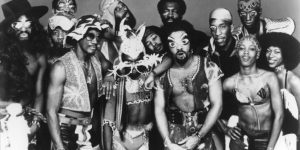CRAM SESSION: An intro to UK post-punk firebrands This Heat
by Jeremy Curry
January 28, 2016
1970s trailblazers This Heat return from cold storage with new reissues.
This Heat are one of the most unique bands to emerge from the 1970s. Mangling together wild spurts of punk, prog, jazz, and industrial music, the British trio created a complex and confrontational noise.
The original incarnation of This Heat was formed in Camberwell, London by Charles Bullen, Charles Hayward, and Gareth Williams. After the two Charles began as the improvisational duo Dolphin Logic, they enlisted non-musician Williams to bring their approach to an unexplored level. It’s hard to pinpoint influences other than industrial agitators Throbbing Gristle and krautrock titans Can, but Bullen sums it up rather nicely: “Fuck influences! We were trying to break free!”
Following a short string of progressive and politically-charged releases, This Heat sadly split up in 1982. However, the three members continued to work on separate projects. After traveling to India to study Kathakali dance-drama, Williams co-authored the first Rough Guide To India, and later formed the duo Flaming Tunes with Mary Currie. Bullen’s Lifetones project conjured eerie visions of dub, while he also collaborated with groups like Family Fodder. Hayward has been the busiest of all, performing as a member of The Raincoats and Crass, while also founding bands such as Camberwell Now, Monkey Puzzle Trio, and About Group.
This Heat regrouped to rehearse in December 2001, but were tragically cut short when Williams died of cancer that month. Their music has since reached a cult status, as most of it hasn’t been widely available until now, with four classic releases being reissued by Light in the Attic. This February 12th and 13th, Bullen and Hayward will perform a two-day residency at London’s Cafe Oto venue with a show titled “This is Not This Heat.” It will mark exactly 40 years to the weekend that the group played their first show.
Read on for a rough guide to the universe of This Heat:
This Heat – Made Available: John Peel Sessions (1977)
The group’s first recorded performance was on John Peel’s radio show in 1977. The session starts off with a bang, all eerie organ lines, sloppy solos, and imagined sounds of an alien abduction. It’s a Twilight Zone soundtrack with even more twists and turns. “Not Waving” is a sharp break from the jarring jam of “Horizontal Hold”, steeping bleeps and drones with a light vocal touch. The electronics get progressively louder and push their way to the front with minimal percussion. Ahh… take me to your leader. Using whatever equipment they could get their hands on, the trio made treasure out of trash.
This Heat- This Heat (1979)
From the buzzing of “Test Card” straight into a squealing take on “Horizontal Hold”, it’s clear the band’s debut is going to be an intense listen. Scrappy solos, synth spotlights, and various bleep bloops over tightly wound drums pile up like a junkyard, yet every part feels perfectly placed. Freeform compositions like “Water” offer a calm between the intensity, but why would you want to pause? This is the beginning of something big. “Twilight Furniture” sounds a bit post-punkish, but never actually reaches a proper climax.
Sure, this is only the first of two proper studio releases, but it feels cinematic. There are so many different moments to uncover, so dive in deep. Every cliche of a musical genre is crushed.
This Heat – Deceit (1981)
Deceit is the second and final studio album from This Heat. This fan favourite is often regarded as a classic of the post-punk era. The album has its straighter moments, but still manages to stick out like a sore thumb, splicing together improvisations and live sessions with its studio recordings. Following dreamy opener “Sleep”, “Paper Hats” speeds into a chaotic crunch before slowing to a head-bobbing groove that becomes more lo-fi as the song progresses. The album’s underlying theme was based on the fear of nuclear warfare, depicted on the cover with a collage of artillery, maps, Richard Nixon, and mushroom clouds.
For serious fans, the catalogue stretches further with bootlegs and extra tracks in the box set Out of Cold Storage, released in 2006.
Lifetones – For a Reason (1983)
Lifetones is the post-This Heat side-project of Charles Bullen, captured on a single album. The dub-filled masterpiece brings a slouchy, narcissistic vibe, like the constant feeling of putting out your cigarette in an ashtray. Though obviously influenced by reggae and dub, it combines beautiful guitar riffs reminiscent of Steve Reich’s Electric Counterpoint. It’s a very chilled out record, but a bit of a bummer, with Bullen’s vocal stylings sounding sullen and detached. It’s an interesting offshoot coming from Bullen, but there’s never any way to expect anything in particular from these artists steering clear of musical cliche.
Alongside This Heat’s self-titled debut, the Health and Efficiency EP, and Deceit, Lifetones’ For A Reason is also reissued by Light in the Attic.
Camberwell Now – Meridian (1983)
This is almost a This Heat record, but without Bullen. Recorded after the band had split, you can definitely hear how sparse it is without that rangy guitar screaming into the thick. The tunes are still weird and wonky, but with more of a minimal feel. Vocals are now the main focal point, and it sounds more like a proper pop record (in the loosest sense). The song structure is sound, but everything else is a bit… off? Instruments are thrown into the mix until it’s hard to keep track of what is coming and going. Is somebody singing into a kazoo? Try it! You might like it!
Gareth Williams and Mary Currie- Flaming Tunes (1985)
This is a wonderful release from Gareth Williams and Mary Currie. Flaming Tunes takes on more of a minimalistic approach with synths, drum machines, and influences of William’s travels in India. Lo-fi heads would go nuts for this album. These pleasant pop songs bring an almost childlike quality in the instrumentation and recording. Though it’s wildly different and a lot quieter than the music of This Heat, the squiggly electronics are still present. If you’ve been blasting Deceit, put this on after to come down.
About Group – Between the Walls (2013)
About Group was formed by Charles Hayward, recruiting Alexis Taylor of Hot Chip, John Coxon of Spring Heel Jack, and Derek Bailey collaborator Pat Tomas for an improvisational album. In 2011 they released the album Start and Complete with traditional song structures, and followed suit here in 2013.
Between the Walls has a lot more structure than Hayward’s previous releases, including a cover of the Burt Bacharach hit “Walk on By.” It’s a pretty mellow album, despite some wailing guitar and synth blasts. It keeps the improv brief, and stays safe, which is kind of a pity. The songs are nice, but sometimes you want some weirdness thrown in the mix. Start with this one if you have sensitive hearing or want a romantic tune with some skronk thrown in every now and again.
Tags: Music, Featured, cram session, post-punk, this heat





